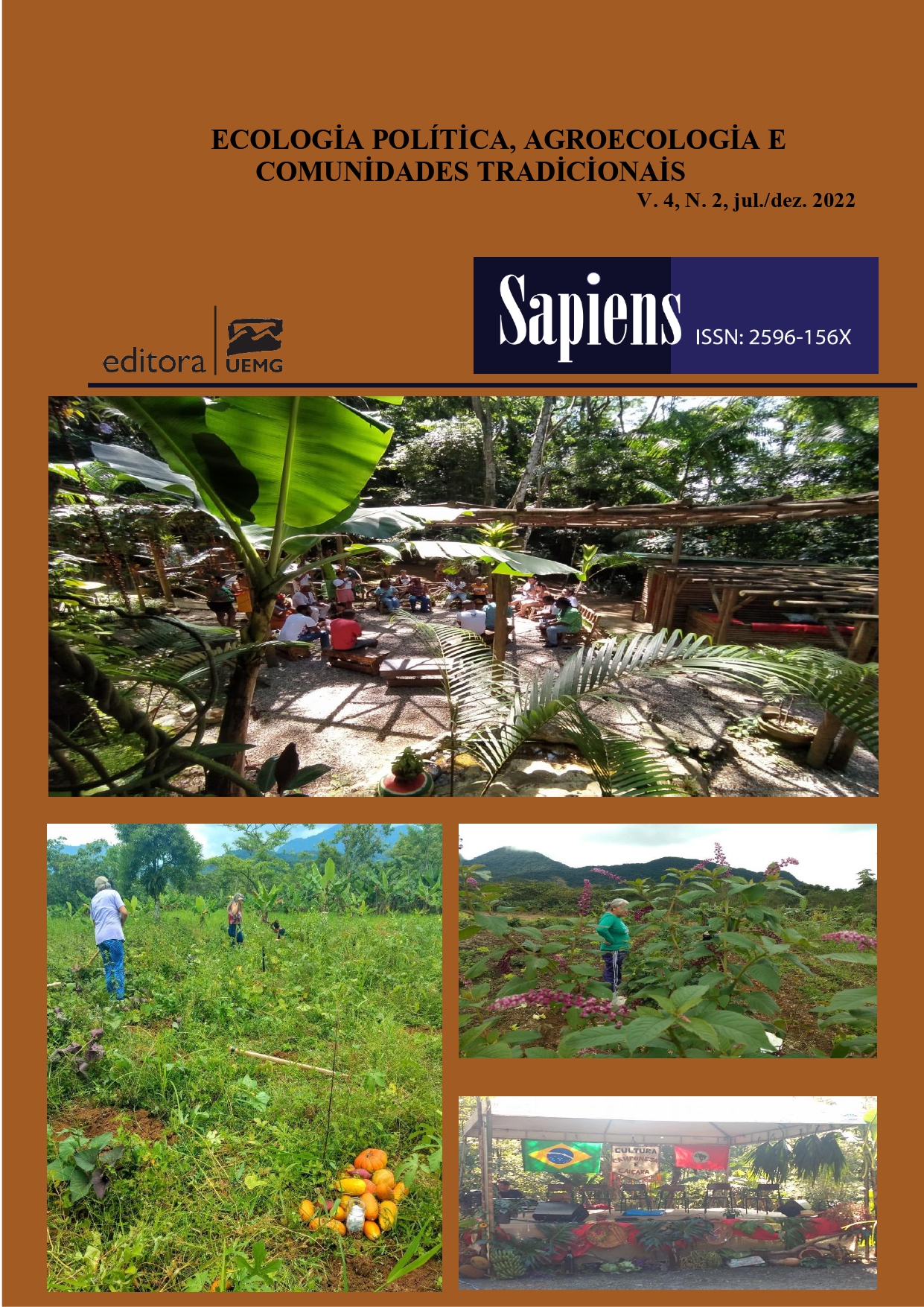Socio-environmental conflicts in the Territory of the Extreme South of Bahia and the Egídio Brunetto Popular School of Agroecology and Agroforestry: popular struggle and liberating pedagogical strategies in the construction of agroecology.
DOI:
https://doi.org/10.36704/sapiens.v4i2.7181Keywords:
Agroecology; territory, popular education.Abstract
The popular struggle and liberating pedagogical strategic chapter of the Escola Popular Agroecologia e Agrofloresta Egídio Brunetto (EPAAEB) seeks an analysis of the socio-environmental conflicts in the Extreme South of Bahia, and how the Landless Rural Workers Movement (MST), laid the foundations for the configuration of a massive movement for the construction of agroecology. The chapter rescues some of the educational actions developed by EPAAEB, which resulted in several activities to reverse the current situation of destruction of the Atlantic Forest biome, seeking to break the historical and persistent dichotomy between social development and environmental preservation. We identified the potential of pedagogical tools whose results point to new possibilities for popular construction of agroecology and for elaboration of parameters to formulate public policies in the field of sustainable rural development.
References
ALTIERI, M. A.; CELIA, C. I. N. A agroecologia em tempos del COVID-19. Centro latinamericana de investigaciones agroecológicas, 2020.
AZEVÊDO, F. A. As ligas camponesas. Rio de Janeiro: Paz e Terra, 1982.
BUTLER, C. D. Pandemics: the limits to growth and environmental health research. Current Opinion in Environmental Sustainability, v. 46, p. 3-5, 2020. DOI: https://doi.org/10.1016/j.cosust.2020.10.005
CAPORAL, Frrancisco Roberto. COSTABEBER, José Antônio. AGROECOLOGIA E EXTENSÃO RURAL Contribuições para a Promoção do Desenvolvimento Rural SUSTENTÁVEL Porto Alegre (RS) 2004.
CARMO, Alane Fraga. Colonização e escravidão na Bahia: a Colônia Leopoldina, 1850- 1888. Salvador, 2010. Dissertação (mestrado – HISTÓRIA SOCIAL) – UFBA / Faculdade de Filosofia e Ciências Humanas.
CRESPI, Danielly¹; GALATA, Renato F.²; CASTRO, Terena P.³; NAREZI, Gabriela4 ; BISPO, Leirson D. 5; SOBRAL, João P.6 ; SANTOS, João D.7 ; KAGEYAMA, Paulo. As feiras livres e as cadeias de comercialização de produtos agrícolas na região do Extremo Sul da Bahia. Resumos do VIII Congresso Brasileiro de Agroecologia. Porto Alegre/RS, 2013.
EPAAEB. Escola popular de agroecologia e agroflorestal Egídio Bruneto. Documento interno 2018.
GIRALDO, O.F. Utopias em la era de la supervivência. Uma interpretación del Buen Vivir. México. Itaca, 2014, 33 p.
GUIMARÃES, A. P. O complexo agroindustrial. Revista Reforma Agrária, ano 7, n. 6, nov./dez. 1977.
INSTITUTO DO MEIO AMBIENTE. Silvicultura de eucalipto no sul e extremo sul da Bahia: situação atual e perspectivas ambientais. Salvador, 2008.
MST, Movimento dos Trabalhadores Rurais Sem-Terra. 2019. Agrobiodiversidade associada à mandioca e à produção de farinha em áreas de reforma agrária do Extremo Sul da Bahia: contribuições para o fortalecimento dos arranjos produtivos locais. Relatório Técnico. Piracicaba: IPEF/USP/NACE-PTECA.
NETO, S. P. G. C. Três décadas de eucalipto no Extremo Sul da Bahia. Acesso em http://www.atarde.uol.com.br/bahia/noticias, 2012.
SILVA, Felipe Otávio Campelo et al. Educação em Agroecologia: percurso da construção de uma proposta pedagógica para as escolas do campo do Extremo Sul da Bahia. In: CALDART, Roseli (org.) Caminhos para a transformação da escola do Trabalho, agroecologia e estudos das escolas do campo. 1 ed. São Paulo: Expressão Popular, 2017.
PEDREIRA, Márcia da Silva. O COMPLEXO FLORESTAL E O EXTREMO SUL DA BAHIA: INSERÇÃO COMPETITIVA E TRANSFORMAÇÕES SOCIOECONÔMICAS NA REGIÃO. Rio de Janeiro, 2008. Tese (doutorado em desenvolvimento, agricultura e sociedade) - CPDA. Universidade Federal Rural do Rio de Janeiro.
PERPÉTUA, Guilherme Marini; JUNIOR, Antônio Thomaz. REVISITANDO O CONCEITO DE ACUMULAÇÃO DO CAPITAL: A pilhagem territorial promovida pela Veracel Celulose no Extremo Sul da Bahia. CAMPO-TERRITÓRIO: revista de geografia agrária. Edição especial, p. 225-256, jun., 2016. DOI: https://doi.org/10.14393/RCT112308







